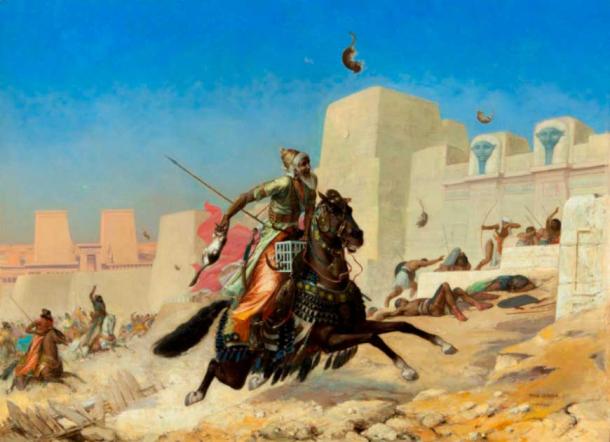Deception has been a crucial tactic in warfare since ancient times, enabling commanders to mislead enemies about their intentions and capabilities. From elaborate ruses to strategic misdirection, these tactics have shaped the outcome of countless battles throughout history.

Credit: Wikimedia Commons
One of the most celebrated examples of military deception comes from the Battle of Cannae in 216 BC. Hannibal, the brilliant Carthaginian general, employed a sophisticated deception strategy that allowed his smaller force to encircle and decisively defeat a much larger Roman army. This battle remains a masterclass in tactical deception, studied in military academies even today.

Credit: Wikimedia Commons
The legendary Trojan Horse stands as perhaps the most famous example of military deception in ancient warfare. According to Homer’s account, Greek forces constructed a massive wooden horse, concealing warriors inside before leaving it as a supposed gift for the Trojans. This cunning stratagem led to the fall of Troy and demonstrated how creative deception could overcome seemingly impregnable defenses.

Credit: Ancient Origins
Ancient generals frequently employed tactics such as feigned retreats, where forces would pretend to flee, luring overconfident enemies into carefully prepared ambushes. These strategies weren’t merely about physical deception; they also played crucial roles in psychological warfare, affecting troop morale on both sides.
The principles of deception developed in ancient warfare have left an indelible mark on military strategy. Modern military doctrine continues to incorporate these time-tested concepts, adapting them for contemporary warfare. The art of deception remains as relevant today as it was thousands of years ago, proving that sometimes the greatest victories are won not through superior force, but through superior cunning.
Categories: Ancient Warfare, Classical History, Historical Strategy, Military History, War History
Tags: Ancient Warfare, Battle of Cannae, deception tactics, Hannibal, Military History, Military Strategy, Trojan Horse
Religion: Multiple
Country of Origin: Carthage, Greece, Italy
Topic: Military History
Ethnicity: Multiple

